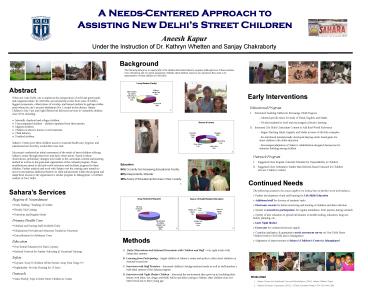Abstract - PowerPoint PPT Presentation
1 / 1
Title:
Abstract
Description:
When one visits Delhi, one is startled at the juxtaposition of well kept green ... health care, hygiene, and educational services they would other wise lack. ... – PowerPoint PPT presentation
Number of Views:102
Avg rating:3.0/5.0
Title: Abstract
1
A Needs-Centered Approach to Assisting New
Delhis Street Children
Aneesh Kapur Under the Instruction of Dr.
Kathryn Whetten and Sanjay Chakraborty
Background
The following data gives a rough profile of the
children that attend Saharas programs (although
most of these numbers were collected as part of a
needs assessment of female street children, based
on my experience they seem to be representative
of street children in Old Delhi)
Abstract
Early Interventions
- When one visits Delhi, one is startled at the
juxtaposition of well kept green parks and
congested slums. In Old Delhi, just around the
corner from some of Delhis biggest monuments,
oldest places of worship, and busiest markets lie
garbage-ridden areas where the citys poorest
inhabitants live. Located in this district,
Sahara Childrens Day Care and Night Shelter has
delivered services to vulnerable children since
2004, including - Internally displaced and refugee children,
- Unaccompanied children children separated
from their parents, - Migrant children,
- Children in abusive homes or environments,
- Child laborers,
- Disabled children.
- Saharas Center gives these children access to
essential health care, hygiene, and educational
services they would other wise lack. - My project conducted an initial assessment of the
needs of street children utilizing Saharas
center through interviews and daily observations.
Based on these observations, preliminary changes
were made to the curriculum content and teaching
method as well as to the goals and organization
of the outreach program. These modifications
aimed to add real-world relevance and facilitate
progress for these children. Further analysis and
work with Sahara over the coming years intends to
uncover and address additional barriers to child
advancement within the program and adapt these
lessons to the organizations similar program in
Jahangirpuri, a Northern outskirt of New Delhi.
- Educational Program
- Structured Teaching Method to Encourage Child
Progress - - Allotted specific times for study of Hindi,
English, and Maths - - Divided students by level and encouraged
collective learning - Increased Life Skills Curriculum Content to Add
Real-World Relevance - - Began Teaching Hindi, English, and Maths in
terms of life-like examples - - Re-introduced internationally developed
playing cards/ board game for street
childrens life skills education - - Encouraged adaptation of Saharas
rehabilitation-designed discussions for character
building among children
2
1
2
- Outreach Program
- Suggested More Regular Outreach Schedule for
Dependability to Children - Suggested More Substantive Rather than
Referral-Based Outreach for Children who are
Unable to Attend
Education 84 Currently Not Accessing Educational
Facility 60 Respondents illiterate 36 Aware
of Educational Services in their Locality
Continued Needs
2
Saharas Services
- The following seemed to be areas ought to be
looked into in further work with Sahara - Further development of and staff training for
Life Skills Education - Additional staff for division of students/ tasks
- Electronic records for better monitoring and
tracking of children and data collection - System to incentivize participation for regular
attendance, from parents, during outreach - System of peer educators to spread information
on health seeking, education, drug use, family
planning, etc - Girls Night Shelter
- Generator for constant electricity supply
- Complete qualitative quantitative needs
assessment survey on New Delhi Street Children
both in Old Delhi and in Jahangirpuri - Adaptation of improvements to Saharas
Childrens Center in Jahangirpuri
- Hygiene Nourishment
- Daily Bathing / Washing of Clothes
- Weekly Nail-Cutting
- Nutritious and Regular Meals
- Primary Health Care
- Medical and Nursing Staff Available Daily
- Medications Provided and Abscesses Treaded as
Necessary - Detoxification for Substance Users
- Education
- Non-formal Education for Basic Literacy
- Referral Network for Further Schooling
Vocational Training - Safety
- Daycare Keep 35 children off the Streets/ Away
from Drugs 9-5 - Nightshelter Provide Housing for 15 Boys
- Outreach
- Semi-Weekly Trips to Refer Street Children to
Center
1
2
Methods
- Daily Observations and Informal Discussions with
Children and Staff - over eight weeks with Sahara
this summer - Learning from Participating taught children at
Saharas center and spoke to other street
children on outreach excursions - Interviews with Staff Members discussed
childrens background and needs as well as staff
members individual opinion of the Sahara program - Interviews with Night Shelter Children
discussed the environment they grew up in
(including their history with labor, sex, drugs,
and theft) before and after coming to Sahara,
other children were not interviewed due to their
young age
Works Cited
- Sahara Centere for Residential Care and
Rehabilitation (2006). Sahara Childrens Project. - Saharas Research Department (2005). A Needs
Assessment Survey on The Girl-Street Child.































